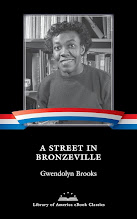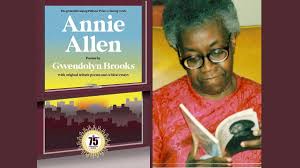A Surprised Queenhood in the New Black Sun
Book Discussion March 29, 2025
Gwendolyn Brooks was a Pulitzer Prize winning poet, author, and teacher who was born in 1917. She was born in Kansas but was brought up on the south side of Chicago.
She won the Pulitzer Prize for Poetry in 1950, making her the first African American to win a Pulitzer. The prize was for Annie Allen, a book of poetry about a young African American girl growing into womanhood. Brooks became the Poet Laureate of Illinois in 1968 and held this position for 32 years until her death. She also was US Poet Laureate for the 1985-1986 term, the first woman to hold this position.
The author of A Surprised Queenhood in the New Black Sun, Angela Jackson, is a poet in her own right. She's been nominated for The National Book Award and longlisted for the Pulitzer Prize as well.
 |
| Angela Jackson, author of A Surprised Queenhood in the New Black Sun |
Kenechia, who was joining us for the very first time, shared, "I am getting back into reading. It was hard getting back in, I had to stop, get back in."
Alejandra told us, "I went into this book knowing very little about Gwendolyn Brooks. I mean I know about her through one of our school’s children's books. I also know about her from her winning the Pulitzer Prize. I felt like a biography of Gwendolyn’s Brooks life would have been better without the literary analysis of her poetry."
Kenechia said, “I agree. I asked myself, ‘Am I reading about her life or the critiques of her work?’ I had to keep going back and forth.”
Alejandra further emphasized, “I enjoyed the parts about her life.”
Bonnie answered, saying, “Well, I loved the book. I don’t like poetry but the explanations the author gave for some of the poems helped me to understand them. The thing that I loved (and maybe because I’m a political person) was her journey from being a Negro to a Black Woman.” Bonnie then had us turn to the following passages:
p. 99 “Nothing was the same for Gwendolyn once she had opened her door for these purveyors of the new blackness. ... She taught them craft...They taught Gwendolyn the way the world now worked. They wanted her to see things from a black position, without equivocation. They wanted her to understand the systemic nature of racism, how it was rooted in white hegemony, a rock-hearted white supremacy, and that supremacy was undergirded by economic exploitation and inequity. ...Gwendolyn did not readily fall in step with the young blacks...They were powerfully anti-white people, whereas Gwendolyn Brooks believed in the intrinsic goodness of all humanity. Hers was an integrationist's point of view.”
p. 108 “The poems of After Mecca...reflect most clearly Gwendolyn’s own state of mind, her psychological transformation from ‘Negro’ to ‘Black Woman.’”
p. 111 “Gwendolyn personifies the Black Consciousness/Plack Power/Black Art movements as one who had awakened and mounted a campaign marked by ‘No’. These movements must say no to the status quo, no to white supremacy, white standards of beauty, white hegemony...”
p.117 “It was the young black people who had ignited the fires that smoldered in her, the young black poets who had put the light in her eyes A new world beckoned.”
Nancy responded with "I actually am a poetry person. I really love poetry. My favorite thing about reading this book is that it got me into reading more of her poetry. I also was really struck by her generosity.”
Ann said, "I liked it because it just really showed the complexity of her perceptions and her honesty. She seemed open-minded about viewing things from different perspectives including herself. I think that degree of honesty and humility, a lot of it might have come from her supportive family. I think she transferred that support from her family into the way she saw other people, despite the challenges she was facing. I was pretty overwhelmed with her openness about looking at things from a non-idealized point of view. She talked about marriage and how every situation has difficulties.”
Shelara went further, stating, “I’ve loved Gwendolyn Brooks since I was in high school. I analyzed ‘The Mother’ in my English class. Even though I am familiar with her poetry, I didn’t know her history. I always associated her with the Black Arts Movement, and I knew she was an older woman during the Black Arts Movement, but I never realized that she was also a child of “the greatest generation.” She lived through the Depression and World War II. Reading some of the tidbits of that was very interesting for me, reading about her life. I think this is not a biography, but a biography of her work and I think that it’s more of the legacy. It does make me want to read Gwendolyn Brooks’ autobiography. I loved the title; I think that was the greatest part of the book.”
p.116
“In her 1972 autobiography, Report from Part One, Gwendolyn Brooks wrote:
'I – who have ‘gone the gamut’ from an almost angry rejection of my dark skin by some of my brainwashed brothers and sisters to a surprised queenhood in the new black sun – am qualified to enter at least the kindergarten of new consciousness now...I have hopes for myself.'"
Shelara continued, “It’s kind of the story of a late bloomer who never found her people until late in life and when she found her people she became their queen. She became their patron. I really admire her life. There was an evolution, right? (People in the publishing industry) told her the same thing they told Toni Morrison forty years later, ‘Your work won’t appeal to people, it’s not universal, because it doesn’t have white people in it.’”
 |
| Her long poem In the Mecca was published in 1968 and nominated for the National Book Award |
Maria added, “I was very impressed with her civic engagement, her generosity, it was purposeful and intentional. She shared herself with other people around her. And she became beloved; didn’t they name a library and a school after her? I was very impressed with her as a human being. I really enjoyed the book, and I appreciated Angela Jackson explaining the poems because I’m not a poetry person.”
Alejandra commented, “I think what goes along with the civic engagement is just ‘teaching’ She was just a wonderful teacher. As teachers, our motto is 'We're the gardeners, we plant seeds into children and hope they take root.’ The stories I hear about women, especially women who are so accomplished, are often being torn down for being mothers, but she was able to balance this. She was like, 'I am certainly a mother and let me go get my Pulitzer.'"
Shelara, elaborating on the topic of Brooks winning the Pulitzer Prize, “And then the story of her winning the Pulitzer. Her lights were off. She was so afraid she’d have to explain to the reporters who came to the house why her lights were off. As it turned out, someone had secretly paid the electric bill, and the lights were turned back on. Just the idea of her winning a Pulitzer Prize and not having money to pay the electric bill. It’s a hard thing for the Black artist. If you get money, lots of times there’s a patron and the artist has to create the work that the patron wants. Gwendolyn Brooks didn’t want wealth, but she should have been able to live in a nice place, have food, have her lights on. And then what’s extraordinary was her giving. She gave literary prizes out of her own money to inspire young people. I knew she really mentored young poets, but I had no idea she was generous with her mentorship and her community.”
Kenechia followed up with "I did have a hard time reconciling her success with the lack of money. I think that having the kind of husband she had made the difference. There was no talk about her husband having an issue with her taking money from the household to give these prizes. This could have been an issue.”
Wendy told us, "I did not know about Gwendolyn Brooks. I thought the book didn’t have enough of her poetry. I thought, ‘Maybe I should be reading a book of her poetry.’ And then I considered her growth as a poet She had this capacity to reflect on what she saw so deeply”
Shelara shared, "I want to talk about where she was ‘planted,’ because Chicago, specifically the South Side of Chicago was such a mecca of artists. Like there’s a reason why we get so many people that come out: Richard Wright, Lerone Bennett. There are all of these people. It’s also because of her neighborhood. When you grow up in a neighborhood of Black people, similarly to the difference between those people who went to HBCUs (Historically Black Colleges and Universities) and those Black people who went to PWIs (Privileged White Institutions.) People who went to HBCUs fill the space differently, at the job, in the world. I think that when your community is Black people and you see people that you can admire, there’s no question in your mind that Black people are capable.
Laura told us, "The first poem I ever read by her was 'The Mother and it blew me away. I found another poem on page 150: “Horses Graze”
Cows graze. Horses graze. They
eat
eat
eat.
Their graceful heads
are bowed
bowed
bowed
in majestic oblivion.
They are nobly oblivious
to your follies,
your inflation,
the knocks and nettles of administration.
They
eat
eat
eat.
And the crest of their brute satisfaction,
with wonderful gentleness, in affirmation,
they lift their clean calm eyes and they lie down
and love the world.
They speak with their companions.
They do not wish that they were otherwhere.
Perhaps they know the creature feet may press
only a few earth inches at a time,
that earth is anywhere earth,
that an eye may see,
wherever it may be,
the Immediate arc, alone, of life, of love.
In Sweden,
China,
Afrika,
in India or Maine
the animals are sane;
they know and know and know
there’s ground below
and sky
up high.
By Gwendolyn Brooks.



Comments
Post a Comment